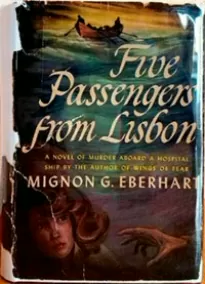Five Passengers from Lisbon

- Автор: Mignon Eberhart
- Жанр: Детективы
Читать книгу "Five Passengers from Lisbon"
Marcia started to follow her, remembered that Mickey would expect to find her somewhere on deck and, after waiting a few moments, leaning against the railing, she turned and strolled slowly along the lighted white lane of the deck, forward. Watching, as she strolled, the curling white tops of the waves, and the red and gold glitter of the reflected lights from the ship, listening to the murmur and rush of the ship plowing her sturdy way through the water. And the lulling sound of the sea, the feeling of security, of being on an American ship which was the same as being on American soil, seemed to give her a feeling of recovery of herself. As if the girl she had been, the Marcia Colfax who had set gaily forth on the Normandie so long ago, had disappeared, gone away, been asleep, somewhere; as if another girl had taken her place, a woman rather, who had had to summon the strength to combat terror, and hopelessness and sorrow and cold and sometimes hunger. And now that woman had gone again, and Marcia Colfax herself had returned. It was indeed, as if the night just past had been a climax, a final curtain to a play in which she had played a hard and exhausting role.
But now it was done, the curtain down forever.
She reached the bow and could look down on the fo'c'sle, its capstans and ventilators looming ghostly in the light with sharp black shadows. The deck roped off in sections in the daytime to provide specified deck spaces for patients, and nurses and doctors and ship's personnel, was now clear so she could walk entirely around the ship. She rounded the bow and emerged on the port side and another long strip of clean white deck, brightly lighted, stretched ahead of her. About midway along it she paused to lean against the railing and watch the red and gold glitter of light reflected from the shiny black waves. The air was fresh and cool on her face; she pulled her coat around her throat. Even the coat, thick and comfortable and warm, was like the blessing of her own land. By the very act of dressing in the nurse's uniform and chucking away the shabby, worn clothes she had had on the Portuguese boat, she had stepped back into her own identity, back to the Marcia Colfax who was really herself.
That, of course, was fanciful; and she wouldn't think of things that were now in the past.
She wouldn't, in fact, think of the previous night.
But she did, of course. The furiously pitching lifeboat, the cold, the despair, and a man who had been murdered in that tiny boat, while all of them were facing a death that had seemed certain.
But Daisy Belle and Mickey must have been right in believing that one of the seamen had done it—crazed, as Mickey said, by fear, or holding so deep a grudge that it superseded and held sway above the fear of death itself. A deep grudge indeed, thought Marcia with a kind of horror. Yet she had seen human emotions on a strange and horrible rampage. She knew, everyone knew now, that such things could happen.
Daisy Belle with her cool knowledge of the world was right. Mickey was right. One of the seamen would confess.
The wind was lessening but the sea was definitely heavier.
On the bridge Captain Svendsen in a heavy coat, with his cap pulled down and shading those shrewd, deep-set eyes, peered into the darkness for a while and then went in to study the barometer and the weather reports. Unless he was greatly mistaken, the wind would soon drop off altogether and they would run into fog and Captain Svendsen hated fog. He never left the bridge in a storm or in fog; he had food sent to him. If it was a bad storm or a long stretch of fog, he lived mainly on coffee and cigarettes while his ruddy face took on a grayish tinge and large gray pockets came around his eyes. He sighed now, wearily; fog it would be, no question of it. And hundreds of lives in his care.
And this complication of a murdered third officer of a tiny Portuguese cargo boat was an added care. He could put all the people from the lifeboat under guard, of course; one of them must have murdered the fellow. But there was, of course, that annoying question of time, and opportunity and rigor mortis; none of the
He wished momentarily that he had not seen the rockets of distress and the lifeboat; and then, because he was a decent and honest man and besides had the etiquette of the sea engraved not only on his heart but in his bones, he hurriedly retracted that thought. He'd have to do the best he could, and just at the moment the fog was the main thing, and the sick and wounded soldiers he must get home as fast, as comfortably, as safely as it could humanly be done. Alfred Castiogne would have to wait.
Otherwise everything about the ship was in its usual orderly groove. The engine rooms were lighted and busy, the sick wards settling down for the night. The radio had been turned off and lights at the various portholes were dimmed as the nurses went about, seeing that their rows of patients were comfortable, checking the orders given by the doctors for each ward, reading the charts, following out every detail of the careful and unrelaxing routine. The ship had grown very quiet.
Marcia, however, still leaning against the railing, was so engrossed in her own thoughts that she did not hear the rapid footsteps of a man coming along the deck aft until he had almost reached her. Then she whirled, thinking it was Mickey.
It was not Mickey; it was, instead, Colonel Morgan. He wore a long army overcoat and a cap pulled low over his face, so she did not recognize him until he stopped for a second under a light near the companionway. Then he seemed to recognize her and came on toward her. "Miss Colfax? I thought that was you."
He had been walking rapidly; his voice indeed seemed breathless and uneven. He paused beside her at the railing and fumbled in a pocket with his uninjured hand and drew out a package of cigarettes.
"I think I'll have another smoke before turning in," he said more evenly. "Will you join me? I'd like to talk to you for a moment, if you don't mind."





